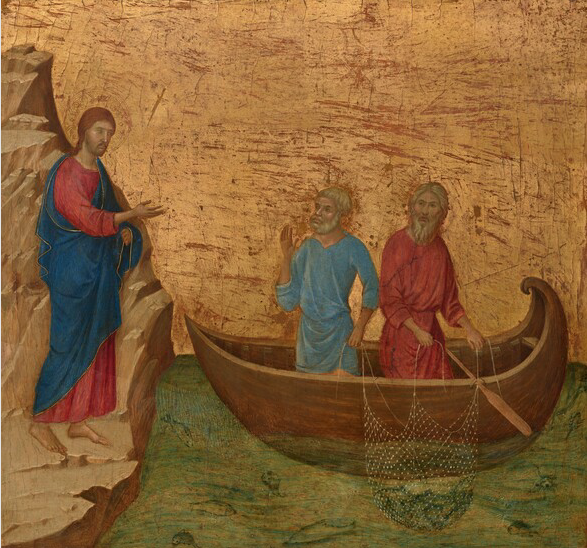
Readings for the Third Sunday of Ordinary Time
During these early weeks of Ordinary Time, we may feel a sense of being between the seasons of Christmas and Lent. Some Catholics prefer to follow the tradition of the Vatican and leave their nativity sets (and perhaps even their trees) out until the Feast of the Presentation of Jesus on February 2nd. The “Carnival Season” remains in some places as a vestige of a joyous between time, where parties and celebrations continued until Mardi Gras (Fat Tuesday). However, many Catholics – like most Americans – have all but forgotten about Christmas by now. The decorations, the celebrations, and the joy of the season has all dissipated. And then, some are already turning their thoughts to the season of Lent, which begins on the earlier side this year – on Valentine’s Day, February 14th. And what’s more romantic than celebrating Valentine’s Day together at the Church while getting ashes?
Interestingly, the readings for the Third Sunday of Ordinary Time seem to feature the theme of penance. The first reading features Chapter 3 from the Book of Jonah, which focuses on penance throughout the book. And in today’s passage, Jonah traverses through Nineveh, announcing its impending destruction. The people believe the message and repent, and God forgives them and does not destroy the city.
The gospel passage from Mark also highlights the theme of penance with Jesus making his own proclamation: “This is the time of fulfillment. The Kingdom of God is at hand. Repent and believe in the Gospel.”
The second reading from 1 Corintians may be more confusing in its specific instructions, but the message is there: the world is passing away and time is running out. What we see is that we are called to live differently because of this truth. St. Paul wants his readers to know the urgency involved with living the Christian life, in contrast to the complacent indulgence we see in our society, and to which we all seem to tend in some way or another.
It is understandable if we feel some ambivalence here; it’s actually not unlike the feeling of being between seasons. We may hear these penitential readings, and think, “Yes, Lord, give me Lent…but do not give it yet” (to paraphrase St. Augustine). Perhaps the regular parties of Carnival season are a good idea after all?
And this is where it would be helpful to have an understanding of the virtue of penance. This virtue is perhaps one of the most forgotten of Christian virtues, perhaps because Thomas Aquinas did not place it in his treatise on the virtues, but rather, among his treatise on the sacraments. Simply put, the virtue of penance is that habit of seeking to amend for one’s sin. Those who have this virtue are able not only to recognize their sin, but desire to do penance for it, and actually to do penance for their sin. Thomas discusses this virtue with the sacraments specifically because he sees it as the virtue possessed by those who seek the sacrament of penance, which we more often call “Confession” or “Reconciliation.”
Lent is the season we all associate with repentance. We begin Lent with fasting, like the repentant Ninevites. We take up our individually chosen “Lenten resolutions,” hoping to reach Easter as a better people than when we started. And sometimes we succeed in our resolutions. At other times, we fail.
Generally we are ill-prepared to observe Lent as we should because we have not exercised the virtue of penance regularly. Like all virtues, penance cannot be developed and maintained in only 40 days a year. Rather, we must strive for the regular practice of penance throughout the year. If we look to Thomas, we know this means regularly seeking the sacrament of penance. But we also should look to the larger traditions of our Church, which has long observed Friday as a weekly day of penance, in addition to the penitential seasons of Advent and Lent.
These readings coming to us on the Third Sunday of Advent should highlight for us that penance is for NOW. We hear that urgency of Paul, and we know that we should not wait until Lent to recognize our sins and seek to make amends for them. We hear another urgency in these readings: in the gospel passage from Mark, Jesus calls Simon, Andrew, James, and John, and they all leave their nets and follow Jesus immediately. Following Jesus is the most important task at hand, and our sins can pull us back from becoming disciples. We can let our faults, flaws, and sins distract us from this task. We may delay following Jesus fully because we want to pursue comfort and enjoyment; like that wealthy young man, we may walk sadly away from Jesus and back to our many possessions.
The virtue of penance asks us to see our sins as something that can draw us toward Jesus, aiding us in becoming his disciples. When we name our sins and want to make amends, when we seek the sacrament of Confession, and when we choose to do little penances, making sacrifices to amend for our sins, we grow closer to God. In recognizing our sins, we also recognize our need for God. We know we are not perfect or self-sufficient. We need God’s grace and we see how much God wants to give it to us. Thomas notes that we can never actually amend for our sins; yet God, whose mercy transcends justice, can forgive us our sins despite the inadequacy of our penitential acts.
Possessing and practicing this virtue of penance does not mean living a miserable and depressed life, deprived of all enjoyment. In fact, as many of us have experienced, we often find great joy during the season of Lent when we are practicing some self-control in doing our Lenten penances. This is true when we practice some penance outside the season of Lent as well, and the best news is that it’s quite easy to implement.
One idea is to stick with the long-standing tradition of the Church by not eating meat on any Fridays throughout the year. Another idea is to pick a Lenten resolution a few weeks early and start practicing by observing that resolution on the next few Fridays (just one day a week!). We all probably have some pet peeves or least favorite things to do; these may be good opportunities to practice the virtue of penance as well. For example, if we get frustrated by certain drivers on the road, we can smile, take it cheerfully, and offer our annoyance as penance for our sins. If we don’t like making dinner or taking out the trash, we can offer our time spent doing these tasks as penance for our sins. And, of course, a regular examination of conscience and seeking the sacrament of Confession is also a great way to practice the virtue of penance.
These small acts can be done even if we want to celebrate a Carnival season, continuing that joy of Christmas we so recently experienced. If we think of the Holy Family, fleeing from Bethlehem to Egypt, undoubtedly there were many hardships and sacrifices to be endured. And yet, as those of us who have been blessed to raise newborn babies know, even in the midst of difficulties, that small child brings great joy. And while practicing the virtue of penance by small, regular acts of penance, we also will find great joy when we choose to follow Jesus.


